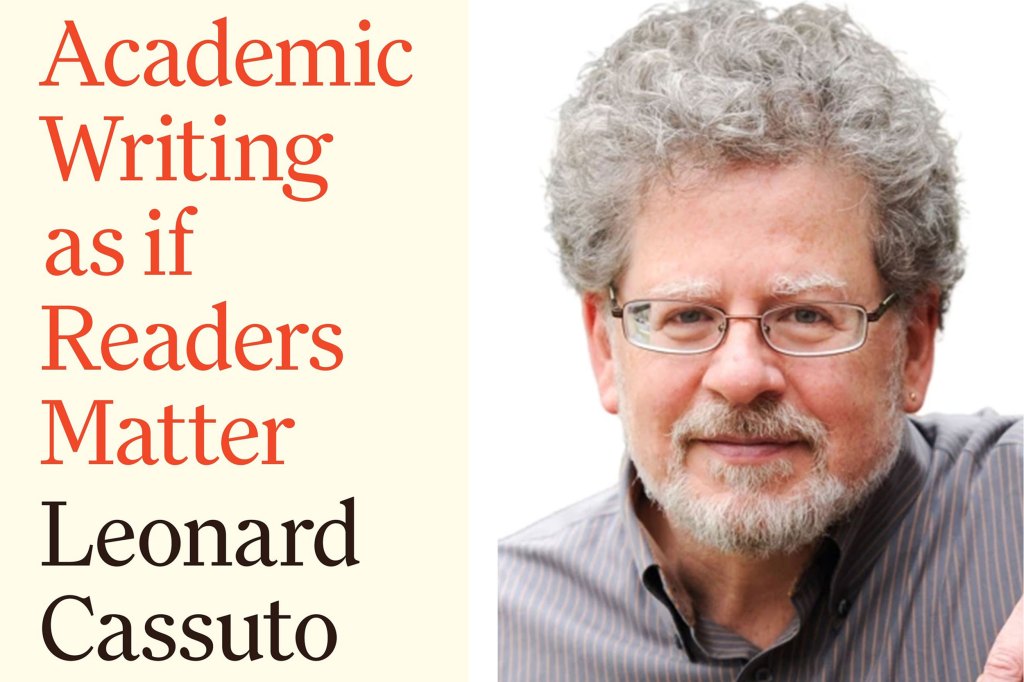Universities are repositories of fascinating ideas. So why is academic writing so boring? Leonard Cassuto thinks it’s all a matter of keeping in mind that good writing is about keeping the reader interested. (Hint: Be a better storyteller.)
Cassuto, A.M. ’85, Ph.D. ’89, a Fordham English professor and journalist, recently published a new book, “Academic Writing as if Readers Matter.” He said he got the idea for the project while teaching expository writing as a graduate student, helping writers with different backgrounds and interests hone their communication skills, particularly in academic writing.
Cassuto’s desire to help make academic writing more accessible and compelling has dovetailed in recent decades with his participation in ongoing discussions to rethink graduate education. The goal there is to focus more tightly on work that advances society, not just some arcane academic interest — along with being able to better explain that work to diverse audiences.
Cassuto recently spoke to the Gazette about his work. This interview has been edited for length and clarity.
You start your book by pointing out that all academic writers begin their careers writing for one person: their teacher. Why does that create problems?
This is the primal scene of academic writing: some student writing some paper for some teacher someplace. It happens again and again and is the process by which we are socialized into the community of academic writers.
The distinguishing feature of that primal scene is one that I think gets very little attention, namely that the reader (in this case the teacher) is being paid. You grow up as a writer where your audience is one who can never be bored or discouraged because they’re being paid to read to the end of it. You’re learning in some sense that the reader doesn’t matter that much and that they’re going to be with you no matter what.
This is inevitably the root of many potential bad habits, which can burst into flower as writers become more and more advanced. One of the core motivations of this book is to encourage writers to recognize this relationship and to try to eclipse it — to write as though the reader is not being paid. The results are going to be much better in every respect.
Academic writing has a bad reputation, particularly among readers who value good prose. Would you say that criticism is deserved?
Increasingly so, and this book serves as both a handbook and an advice book. That’s the book’s beating heart.
But another central objective is to understand academic writers as a community. When we are writing, we’re not just writing for ourselves. If we alienate our audience, individually and collectively, it’s part of a larger problem that we’re all creating.
Academia and higher education have to be a public good. In order for that to happen, we need to be able to communicate in a way that people are going to hear what we’re saying and receive the message. Whether these are scientists writing about how to make semiconductors or whether it’s a professor of politics who’s writing about how we should understand the geopolitical context of an event that’s happening someplace in the world, if academia is going to do its job and take care of the public, then the communication has to be intact. Otherwise it creates disdain for that project and skepticism about what emerges from the academy. It’s the business of the community, collectively.
The tips and the advice about how to become a better writer have to be a collective objective. We have to get better; we have to repair the relation between town and gown so that we can continue to take care of each other productively.
“Too many people in academia think it’s more important to show that you’re smart than it is to communicate with somebody.”

What are some of the most common pitfalls for academic writers?
Here are a few of the greatest hits: One is that too many academic writers don’t understand the importance of story. Stories are how human beings have been communicating with each other since before we could write. Human beings are storytelling animals. We are people who live by story, and every argument is a story, and every story is an argument. If academic writers are most accustomed to thinking of themselves as making arguments, then it needs to unfold in a narrative way. If it doesn’t, it’s not going to be as successful.
Then, academic writing is riddled with jargon. Jargon doesn’t have to be a bad thing; it can be an efficiency, where people are talking to other people who understand the same language. But jargon creates an in-group and an out-group, those who understand and those who do not. If your reader is not necessarily a member of that in-group, then you’re being — simply put — unfriendly. You’re saying, “I don’t really care about you.” That sort of relationship is not productive of collaboration, either in the present or in the future.
And third, too many academic writers don’t understand the necessary relationship between the abstract and the concrete. Without the concrete, the abstract is a bunch of airy-fairy ideas that are floating off in the distance. Every time the reader thinks they’ve got a grasp on them, it turns out they are wisps that drift away. But without the abstract, the concrete is just a pile of bricks, a bunch of facts that aren’t being tied together by anything. We need the abstract and the concrete to coexist. If a writer neglects this necessary connection, the chances are they’re not going to be able to be as persuasive.
You make the case that academic writing can actually be fun. How would making academic writing more fun prove a benefit to a scholar or a student?
I think that if writers remember they are people who are talking to other people, that’s the first step. There is a difference between good and bad scientific writing, and it isn’t just about questions of clarity; good science writing is also animated by sensibility. Sensibility can take many forms.
In this book I use a lot of lively metaphors. They’re designed not only to teach but to also to make the reader smile. There are different ways to communicate a sense of self or a sense of voice. The conventions of a particular discipline might dictate guidelines around that, but you can still have a voice.
Creative writing and academic writing are often seen as being at odds with one another. Can academic writing be creative?
“Creative writing” is a term of art that we use to talk about fiction, poetry, and drama, but if we think about what the words in the phrase actually mean, something that’s creative is original; it has vitality.
You can find a lot of fiction, poetry, and drama that isn’t creative by that definition, because it’s cliched, hackneyed, dead on the page. And inversely, you can find writing that is not fiction — such as academic writing — that exhibits all of these qualities that we attribute to the creative. There’s originality; there’s the vital spark, a sense of life on the page.
All writers should think of themselves as creative writers, that you’re going to do your best work if you try to create something where there wasn’t something before.
Some of these bad writing habits stem from academic anxiety or the fear the writer might be seen as “clodpoll,” as you so eloquently put it. How can writers work through that fear?
Academia as a culture promotes some bad habits of thought and being. Too many people in academia think it’s more important to show that you’re smart than it is to communicate with somebody. In fact, a writer, fearing being called “not smart,” is going to construct all kinds of defenses that inhibit understanding and communication. It tells their reader, “If you work like a sled dog, you might be able to understand it; unless you can’t, in which case, well, that’s your problem.”
I think too many academic readers have had the experience of pushing through academic writing that behaves that way. We’re not taught often enough that writing clearly and crisply is more apt to be seen as smart, more apt to gain respect — and also more likely to communicate learning.
But culture is very persistent. I understand how hard it can be to change culture, and this book is a gesture and a call for us to examine the culture in which a lot of academic writing is produced.
It’s worth noting that public awareness of A.I. — specifically, ChatGBT, which can be used for writing — burst on the scene as you were working on this book. How do you see A.I. helping or hurting academic writing?
A.I. is a tool. We have absorbed the impact of new technology before, and I think we’re going to do it again. A.I. raises legitimate concerns in many areas of our practice, but I think ultimately it will take its place in our tool kit, and we will do what we need to do in order to use it thoughtfully and productively.
I think the great fear that A.I. is going to replace us is overwrought because of the importance of sensibility. We’re still at the very beginning of learning how to use it, but I hope writers will ultimately benefit from having another tool in their kit, particularly if it can help them do their work faster.
What do you hope readers will take away from reading your book?
Writers need to communicate with a reader who is an actualperson. If we understand and appreciate that those people are out there wanting to learn from us as writers, then we can understand and anticipate their needs. We’ll produce better work. That work has a chance to be part of something bigger than us.
Academic writing is an enterprise, and each individual writer should be the best writer that they’re capable of being. We’re in this together, and we have to be able to understand that this community needs good writing in order for us to exist sustainably and productively with the larger society.
Source link

